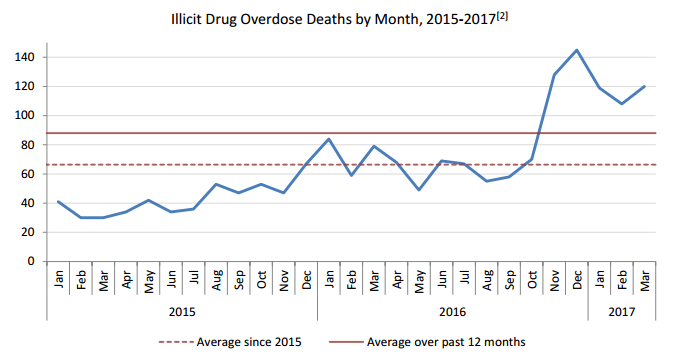(Story by Shannon Waters)
In the year since BC’s overdose epidemic was declared a public health emergency, the rate of fatal overdoses has fluctuated but no downward trend has emerged.
While enrollment in substance use treatment programs has increased dramatically and thousands of overdoses are being reversed, Chief Coroner Lisa Lapointe says the battle is likely to be a long one.
“We’re starting to realize now, a year into this, that there is not going to be a quick turnaround. I think we’ve all become realistic to understand that, with fentanyl in the illicit drug stream, this is going to continue to a huge risk for those using drugs.”
Lapointe says long-term measures will be key to bringing down the death toll. She points to evidence based treatment options and meaningful, realistic early education about the effects and risks of drugs as important tools in the fight.
Another 120 British Columbians lost their lives to drug overdoses last month, making March the province’s third deadliest month ever for overdose deaths and the worst so far this year.
“I think what this tells is is that use of illicit drugs is far more significant across the province than anybody realized. The introduction of fentanyl to the illicit drug stream has changed things tragically, drastically.”
Fentanyl was detected in nearly 2/3 of fatal overdoses in January and February of this year.
Lapoint says, despite the large number of deaths, thousands of people are now being saved thanks to public education and the distribution of the overdose reversing drug naloxone.
While Lapointe acknowledges that stopping people from using drugs is impossible, she says there is one thing that most fatal overdose victims have in common.
“People are using illicit substances and the people who are dying are using at home. They’re in private residences and they’re not anywhere where they can get medical assistance immediately. That’s a huge risk. If you’re going to use illicit substances, you have to be with somebody who can give you medical intervention immediately.”
More than half of those who died of overdoses last month were in a private residence at the time.
Something going on in the Cariboo you think people should know about?
Send us a news tip by emailing [email protected].










